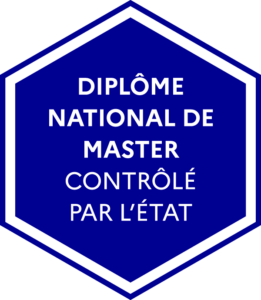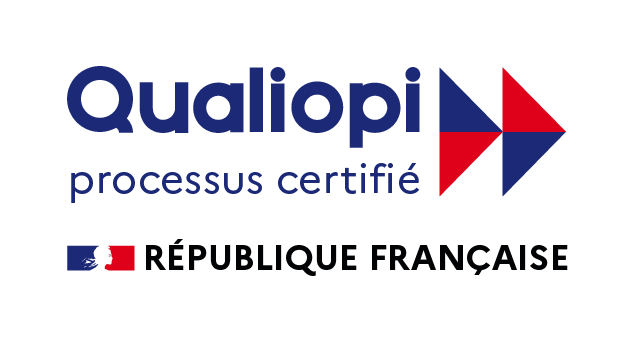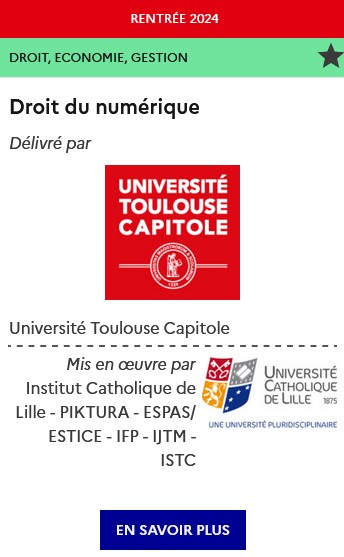Master Droit, Gouvernance et Digital
Master Law, Governance & Technology
Diplôme reconnu par l’État en convention avec l’Université Toulouse Capitole
Le Master Law, Governance & Technology prépare les étudiants à s’impliquer dans la gouvernance du et par le digital tant dans les entreprises que dans les institutions publiques ou tout secteur de la vie sociale. Grâce à la combinaison d’une formation juridique solide alliée au développement de compétences en technologies, sciences humaines et développement de projet, les étudiants sont à même de répondre de manière réfléchie aux défis de la transition numérique.
Le master forme des juristes agiles, capables de s’adapter, d’anticiper et de créer la société digitale de demain, dans une démarche pragmatique, responsable et imaginative.
![]() Lieu de formation : Campus Issy-les-Moulineaux
Lieu de formation : Campus Issy-les-Moulineaux
Prérequis
- Accessible aux étudiant ayant validé une Licence de Droit ou un master 1 de droit ou diplôme équivalent.
Les objectifs

Maîtriser les instruments de régulation innovants développés en réponse à la croissance rapide des technologies numériques

Analyser de manière critique les enjeux normatifs globaux de la transition numérique

Identifier les défis et opportunités à travers différentes industries, zones géographiques et juridictions

Mobiliser des méthodes de recherche avancée pour répondre à des problèmes complexes dans des situations d’incertitude

Concevoir des solutions innovantes, originales et responsables
Collaborer et développer des projets avec différents acteurs et expertises

Anticiper les transformations des pratiques juridiques et leurs effets
Les + de cette formation
La pédagogie
- Une formation internationale : M1 bilingue anglais et M2 100% anglais
- Des enseignements dispensés par des experts internationaux et des acteurs du numérique
- Une ouverture interdisciplinaire vers les sciences humaines pour comprendre la complexité des enjeux de la transition numérique
- Des modules électifs permettant d’explorer et de se spécialiser vers les compétences désirées
- Une approche pragmatique liant théorie et pratique
- Des formats pédagogiques expérientiels variés favorisant l’autonomie et la créativité : projets collectifs, laboratoires, studio, incubateur, hackaton, séminaires et ateliers
La professionnalisation
- Développement de compétences technologiques et digitales afin de pouvoir conduire de projets de transformation numérique dans le privé comme dans le public
- Acquisition de business skills et ateliers professionnalisants sur la transformation des métiers du droit
- Expérimentation de la gestion de projet et de l’innovation entrepreneuriale par la création de start up en partenariat avec l’Incubateur de la FLD
- Un stage entre le M1 et le M2 pour explorer les problématiques sectorielles
- Relation privilégiée avec un réseau international d’intervenants universitaires et professionnels issus du public et du privé
- Possibilité d’échange d’un semestre dans une université partenaire
- Une formation solide en recherche pouvant mener à un doctorat en France ou à l’international
- Accompagnement par le Career Center
Master 1
60 crédits ECTS – 400h
MODULE FONDAMENTAL – 120H
+ Droit & gouvernance globale
+ Human Rights & digital technologies
+ Droit européen du numérique
+ État, administration & numérique
+ Justice digitale & règlement des différends
+ Law, Business & Digital Technology
MODULE EXPLORATION (3 seminars to choose from) – 100H
+ Enjeux internationaux du numérique
+ Internet & Media Law
+ Technologies & responsabilités
+ Cybersecurity & Cybercrime
+ Intellectual Property Law
+ Enjeux contemporains de philosophie du droit
+ Digital Humanities
+ Smart cities, urbanism & digital tech
+ Droit, santé & numérique
MODULE TECHNOLOGIE – 70H
+ Culture numérique & technologique
+ Empirical Skills Workshop – Quantitative Tools
+ Digital Project – Projet collectif en droit & technologies digitales
+ Digital Skills Experiential Workshop
+ Studio Lab Legaltech & Design
MODULE PROFESSIONNALISATION – 50H
+ Legal Writing
+ Transformations des métiers du droit et Prospective Juridique
+ Professional Skills Workshop – Digital Lawyer
+ Studio Lab Politiques publiques & Numérique
+ Stage obligatoire de 2 mois minimum (entre mai et septembre)
MODULE ACCOMPAGNEMENT DES COMPÉTENCES TRANSVERSALES (ACT) – 60H
+ Accompagnement des Compétences Transversales
+ Grand Oral Compétences transversales
Master 2
60 crédits ECTS – 400h
CORE MODULE – 120H
+ Technology Law & Governance
+ Law & Innovation
+ Global Date Law & AI
+ Law, Technology & Society
+ Blockchain, Emerging Technologies and Law
+ Digital Economy
SPECIALIZATION MODULE – THEMATIC ADVANCED SEMINAR – 100H
3 electives
+ Fashion Law & Creative Industries
+ Environmental Governance & Technology
+ Compliance, Risk & Technology
+ Global Antitrust Law & Technology
+ Law & Biotechnologies
3 electives
+ Law, Security, Technology
+ Finance, Law & Technology
+ Space Law
+ Law, Art & Digital Technology
EXPLORATION MODULE – 55H
+ History & Philosophy of Technology
+ Legal Ideas & Complexity
+ Science, Technology & Expertise
+ Experiential Studio in Law &Tech
TECHNOLOGY MODULE – 40H
+ Introduction to Computer Science
+ Digital Skills Workshop
+ Introduction to Data Science & Machine Learning
+ Legal Analytics Studio Lab
PROFESSIONAL SKILLS MODULE – 50H
+ Business Skills & Accounting
+ Digital Project – Start Up Studio Incubator
+ Corporate Legal Operations
+ Digital Project – Design Studio (possible validation by internship
after validation of all other credits )
+ Writing & Research Workshop
PROJECT MODULE – 60H
+ Research Proposal or Start Up Proposal
+ Project Development
+ Final Research Output Disseration or Start Up
+ Transveral Skills Final Presentation
Responsable de la formation
Voir la bio de l'intervenant

Delphine DOGOT
Delphine Dogot est Maître de conférences en droit et numérique à la Faculté de droit de l'Université Catholique de Lille Responsable du D.U Droit & Technologies numériques

Delphine DOGOT
Delphine Dogot est Maître de conférences en droit et numérique à la Faculté de droit de l'Université Catholique de Lille
Responsable du D.U Droit & Technologies numériques
Delphine Dogot est Maître de conférences en droit et numérique. Elle mène des recherches et enseigne en droit et technologies, droit international et philosophie du droit en particulier autour des problématiques liées à la gouvernance globale, à la sécurité et au risque. Elle dirige Le Studio droit/digital, laboratoire collaboratif en droit et numérique. Elle est responsable pédagogique des Ecoles d’été et d’hiver et du DU Droit et Technologies numériques.
Avant de rejoindre la Faculté de droit, Delphine Dogot a été chercheur postdoctoral au Département de droit d’HEC Paris, OXPO Fellow au Nuffield College, Université d’Oxford, visiting scholar à la Harvard Law School, Fellow à la Faculté de droit de Sciences Po et chercheuse au Centre Perelman de philosophie du droit de l’ULB avec lequel elle collabore en tant que chercheuse affiliée.
Elle est régulièrement invitée à enseigner à Sciences Po Paris, l’Université Aix-Marseille, HEC Paris, l’Université Panthéon Assas, l’Universidad des Los Andes, l’Université Libre de Bruxelles et l’Universidad UNISINOS Porto Alegre.
Formée en droit et en philosophie, Delphine Dogot est titulaire d’un doctorat en droit de la faculté de droit de Sciences Po, d’un Master et d’une licence en droit de l’Université Panthéon Sorbonne, d’une maîtrise en sociologie et d’une licence en philosophie de l’Université Paris Sorbonne.
Les intervenants
Voir la bio de l'intervenant

Mónica ARANGO OLAYA
DPhil in Law Candidate at the Faculty of Law at Oxford University

Mónica ARANGO OLAYA
DPhil in Law Candidate at the Faculty of Law at Oxford University
Mónica Arango Olaya is a DPhil in Law Candidate at the Faculty of Law at Oxford University. Her research focuses on sexual harassment in the workplace and the #MeToo movement. She holds a Bachelor of Laws from Los Andes University in Colombia and an LL.M. from Harvard University. She is a Podcaster for the Oxford Human Rights Hub. She was a Graduate Research Resident at the Bonavero Institute of Human Rights between 2020 and 2022 and the Editor of Borderlands section of Frontiers of Social Legal Studies blog 2021- 2022.
Before going to Oxford she was Deputy Justice at the Colombian Constitutional Court and Regional Director for Latin America and the Caribbean at the Center for Reproductive Rights.
Mónica has taught as a Lecturer Public Interest Law Procedure at the Faculty of Law at Los Andes University in Colombia as well as Access to Justice for Women and International Law at FLACSO Argentina. She has also tutored Public International Law, Human Rights and Law and Society at Oxford University.
Voir la bio de l'intervenant

Alejandra AZUERO-QUIJANO
Assistant Professor of Anthropology at Swarthmore

Alejandra AZUERO-QUIJANO
Assistant Professor of Anthropology at Swarthmore
Alejandra Azuero-Quijano is Assistant Professor of Anthropology at Swarthmore. She works at the intersection of law and anthropology. Her research examines the role of legal knowledge in political transition. Her first book manuscript, Redesigning Crime, investigates the relation between design, criminal liability, and forensics. Her current book project, Forensics of Finance, examines the role of financial forensic expertise in shaping Colombia’s most recent political transition. Azuero-Quijano holds an SJD from Harvard Law School and a PhD in Cultural Anthropology from the University of Chicago. Her academic writing is published in Grey Room and PoLAR. Her essays and poetry have appeared in AlJazeera and New American Writing, among others.
Voir la bio de l'intervenant

Othmane BENLAFKIH
Collaborateur au sein du cabinet Gaillard Banifatemi Shelbaya Disputes

Othmane BENLAFKIH
Collaborateur au sein du cabinet Gaillard Banifatemi Shelbaya Disputes
Othmane BENLAFKIH est collaborateur au sein du cabinet Gaillard Banifatemi Shelbaya Disputes, spécialisé dans les arbitrages commerciaux et d’investissement. Avant cela, il était Counsel (Team Supervisor) au Hong Kong International Arbitration Centre (HKIAC).
Othmane a obtenu sa maîtrise en droit à la Harvard Law School, étant distingué comme Dean’s Scholar, et sa licence en droit à l’Université de Hong Kong en tant que Lee Shau Kee Scholar. Depuis 2019, il apporte son expertise en tant qu’enseignant et expert pour le Programme de Développement du Droit Commercial du U.S. Département of Commerce. Othmane est admis au barreau de New York.
Voir la bio de l'intervenant

Ignacio COFONE
Canada Research Chair in AI Law & Data Governance at McGill University Faculty of Law

Ignacio COFONE
Canada Research Chair in AI Law & Data Governance at McGill University Faculty of Law
Ignacio Cofone is the Canada Research Chair in AI Law & Data Governance at McGill University Faculty of Law, where he teaches Privacy Law and AI Regulation, and an Affiliated Fellow at the Yale Law School Information Society Project. His research explores how law should adapt to AI-driven social and economic change with a focus on data harms and algorithmic decision-making. He is the author of « The Privacy Fallacy: Harm and Power in the Information Economy » (Cambridge University Press 2023).
Voir la bio de l'intervenant

Samuel DAHAN
Associate Professor of Law at Queens University and Director of the Conflict Analytics Lab

Samuel DAHAN
Associate Professor of Law at Queens University and Director of the Conflict Analytics Lab
Samuel Dahan is an Associate Professor of Law at Queen’s University and an Adjunct Professor at Cornell Law School. He is the Director of the Conflict Analytics Lab, a consortium for AI research on law and conflict resolution. He is the Chief of Policy at Deel and the Chair of the Deel Lab for Global Employment, a policy institute on global work. Dahan served as a Cabinet Minister (Referendaire) at the Court of Justice of the European Union and Policy Advisor at the EU Commission.
Dahan is leading the development of MyOpenCourt and OpenJustice, two AI legal systems. He is the recipient of both the 2021 Stanley M. Corbett Award for Excellence in Teaching, and the 2020 INFORMS UPS Prize for best program in analytics and AI.
Dahan’s research has been published in such journals as the International Journal of Economic Law; McGill Law Journal; European Labour Law Journal; Industrial Law Journal; Journal of Law and AI; AAAI; and ICML. His work has been featured in Business Insider, Global News, Bloomberg, Semafore, Børsen and HR.com.
Dahan clerked for the French Administrative Supreme Court (Conseil d’Etat), as well as serving as a Cabinet Member at the Court of Justice of the European Union and as a policy advisor at the EU Commission. During the financial crisis of 2008, he acted as an advisor to the financial assistance program in Latvia. Dahan has also been an affiliate faculty member at the Program on Negotiation at Harvard Law School.
Dahan holds a doctorate from the University of Cambridge. He has studied law and dispute resolution at Harvard Law School; the Ecole Normale Supérieure (ENS-Ulm); the Sorbonne; Leuven University in Belgium; and the University of Nice. He was a bronze medalist at the French and UK championships in kickboxing and Taekwondo.
Voir la bio de l'intervenant

Alexandre DUMERY
Maître de conférences, Directeur du Master Droit des affaires et management des risques de l'entreprise en alternance

Alexandre DUMERY
Maître de conférences,
Directeur du Master Droit des affaires et management des risques de l'entreprise en alternance
Alexandre DUMERY est docteur en droit privé et sciences criminelles de l’Université d’Aix-Marseille III (Aix-Marseille Université) après avoir soutenu en 2007 une thèse portant sur la faute de la victime en droit de la responsabilité civile. Il est maître de conférences permanent à la faculté depuis 2009, directeur depuis 2014 du Master 1 Droit des affaires en alternance et du Master 2 Droit des affaires et management des risques de l’entreprise en alternance (DAMARE) sur le campus d’Issy-les-Moulineaux et membre du C3RD. Il enseigne le droit civil (droit des obligations) et le droit commercial (droit des entreprises en difficulté). Ses domaines de recherches sont essentiellement le droit de la responsabilité civile, notamment l’indemnisation des dommages causés par les nouvelles mobilités et le droit des entreprises en difficulté. En parallèle, il prépare son HDR au sein du LARJ (EA 3603) de l’Université du Littoral-Côte d’Opale.
Campus FLD Issy-les-Moulineaux
Voir la bio de l'intervenant

Arthur DYEVRE
Professeur à la KU Leuven et Directeur du Centre for Empirical Jurisprudence

Arthur DYEVRE
Professeur à la KU Leuven et Directeur du Centre for Empirical Jurisprudence
Arthur Dyevre est professeur à la KU Leuven, où il dirige le Centre for Empirical Jurisprudence. Il poursuit un programme de recherche multidisciplinaire sur les institutions judiciaires, l’intégration juridique en Europe et l’analyse automatisée des textes juridiques. Ses travaux ont notamment été publiés dans American Journal of Comparative Law, Artificial Intelligence and Law, European Journal of Law & Economics, European Union Politics, International Review of Law & Economics, Journal of European Public Policy, The Review of International Organizations et Leiden Journal of International Law. Il a enseigné l’analyse de la décision judiciaire, l’IA juridique, la théorie du droit et les méthodes juridiques empiriques à l’Institut universitaire européen de Florence, à l’Université Toulouse-Capitole, la Brussels School of Competition, la Venice International University et l’Université Catholique de Lille. Il est l’auteur de The Future of Legal Theory and the Law School of the Future (Intersentia, 2015) et Constitutional Reasoning in Comparative Perspective (avec András Jakab et Giulio Itzkovich, Cambridge University Press, 2017). Organisateur des deux premières conférences CELS-Europe (2016 et 2018), il est un pionnier de la recherche juridique empirique en Europe. Il a dirigé le projet ERC EUTHORITY (www. euthority.eu) et travaille actuellement sur la persuasion juridique et le style cognitif des juges en droit comparé (COMPASS Project).
Voir la bio de l'intervenant

Charlotte EMIN
Référendaire au Tribunal de l’Union européenne

Charlotte EMIN
Référendaire au Tribunal de l’Union européenne
Spécialisée en droit européen de la concurrence, Charlotte Emin est avocate aux barreaux de Paris et de New York.
Après des études à l’École Normale Supérieure (Paris), elle obtient ses diplômes de droit aux universités Paris I Panthéon-Sorbonne et Paris II Panthéon-Assas, ainsi qu’un LL.M. à Harvard Law School.
Elle débute sa carrière dans un grand cabinet d’avocats d’affaires américain à Bruxelles, où elle défend des dossiers devant la Commission européenne et représente notamment Google dans plusieurs juridictions.
Depuis 2016, elle est référendaire au Tribunal de l’Union européenne (Luxembourg), où elle traite en particulier des affaires de concurrence et d’aides d’État.
Elle a publié plusieurs articles dans des revues et ouvrages spécialisés en droit européen de la concurrence, concernant notamment les mesures provisoires dans le domaine antitrust.
Voir la bio de l'intervenant

Katherine FALLAH
Barrister and legal scholar

Katherine FALLAH
Barrister and legal scholar
Dr Katherine Fallah is a barrister and legal scholar based in Australia. At the Sydney bar, she maintains a mixed practice with a focus on human rights, discrimination, international law, inquests and appellate crime. As a legal scholar she specialises in public international law and criminal law. Her research is principally concerned with the global regulation and administration of violence, and she has particular expertise in the law relating to mercenaries and private military contractors. In addition to her appointment as a visiting professor at l’Université catholique de Lille, she lectures in international humanitarian law and international criminal law at the Australian National University.
Katherine holds a PhD in international law from the University of Sydney, and before her call to the bar was a member of Faculty at Sydney Law School and UTS. She has held visiting fellowships and doctoral research positions at Harvard Law School, the Institute for International and Comparative Law in Africa, the Paris Foundation Maison des Sciences de l’Homme, and the European University Institute, Florence. Her earlier professional appointments include Prosecution Officer at the NSW Office of the Director of Public Prosecutions and Research Associate to the Judges of the Federal Court of Australia.
Katherine is the recipient of several international prizes including the Prix Jean-Pictet for International Humanitarian Law and the Audre Rapoport Prize for Scholarship on Gender for Human Rights, and in 2019 she was the Kathleen Fitzpatrick Visiting Postdoctoral Fellow with the ARC Laureate Program in International Law at Melbourne Law School.
Voir la bio de l'intervenant

Nathan GENICOT
Researcher at the Perelman Center for Legal Philosophy (Université libre de Bruxelles, ULB)

Nathan GENICOT
Researcher at the Perelman Center for Legal Philosophy (Université libre de Bruxelles, ULB)
Nathan Genicot is a researcher at the Perelman Center for Legal Philosophy (Université libre de Bruxelles, ULB). His research focuses on the transformations that law and regulatory techniques are undergoing as a result of the digitization and globalization of our societies. In particular, he studies profiling and rating systems and their history. In addition to being a Visiting Professor at the Université Catholique de Lille, he teaches at the ULB, the Vrije Universiteit Brussel and the Université Paris 2 Panthéon-Assas.
Voir la bio de l'intervenant

Mehdi GHASSEMI
Enseignant-chercheur à l'Institut des stratégies et techniques de communication (ISTC) et chercheur à ETHICS EA 7446

Mehdi GHASSEMI
Enseignant-chercheur à l'Institut des stratégies et techniques de communication (ISTC) et chercheur à ETHICS EA 7446
Mehdi Ghassemi est enseignant-chercheur à l’Institut des stratégies et techniques de communication (ISTC) et chercheur à ETHICS EA 7446 (Université catholique de Lille) – CEThicS. Il étudie le lien entre le regard et le pouvoir au sein des cultures visuelles contemporaines, notamment, les manières dont le regard « surveillanciel » est normalisé, interrogé, ou résisté dans divers produits de la culture populaire, mais aussi dans des expériences artistiques qui traitent de la surveillance comme objet de représentation (surveillance art).
Voir la bio de l'intervenant

Mireille HILDEBRANDT
Research Professor on ‘Interfacing Law and Technology’ at Vrije Universiteit Brussels (VUB)

Mireille HILDEBRANDT
Research Professor on ‘Interfacing Law and Technology’ at Vrije Universiteit Brussels (VUB)
Mireille Hildebrandt is a Research Professor on ‘Interfacing Law and Technology’ at Vrije Universiteit Brussels (VUB), appointed by the VUB Research Council. She has been co-Director of the Research Group on Law Science Technology and Society studies (LSTS) at the Faculty of Law and Criminology from 2019-2024.
She also holds the part-time Chair of Smart Environments, Data Protection and the Rule of Law at the Science Faculty, at the Institute for Computing and Information Sciences (iCIS) at Radboud University Nijmegen.
Her research interests concern the implications of automated decisions, machine learning and mindless artificial agency for law and the rule of law in constitutional democracies.
Hildebrandt has published 5 scientific monographs, 23 edited volumes or special issues, and over 120 chapters and articles in scientific journals and volumes.
She received an ERC Advanced Grant for her project on ‘Counting as a Human Being in the era of Computational Law’ (20,19-2024) for COHUBICOL. In that context, she is co-founder of the international peer reviewed Journal of Cross-Disciplinary Research in Computational Law, together with Laurence Diver (co-Editor in Chief is Frank Pasquale).
Voir la bio de l'intervenant

Iga KUROWSKA
Docteur en droit et Responsable d'innovation

Iga KUROWSKA
Docteur en droit et Responsable d'innovation
Iga Kurowska est docteur en droit de Paris 1 Panthéon-Sorbonne. Elle est Responsable d’innovation dans un groupe Karnov (Région sud), leader européen d’information et de software juridique. Ancienne fondatrice d’une startup legaltech, elle intervient régulièrement pour enseigner aux étudiants et aux professionnels comment l’innovation peut améliorer la pratique du droit.
Voir la bio de l'intervenant

Zacharie LAÏK
Avocat & fondateur de goodlegal.fr

Zacharie LAÏK
Avocat & fondateur de goodlegal.fr
Zacharie Laïk, avocat inscrit au barreau de New York et détenteur du Certificat d’Aptitude à la Profession d’Avocat (CAPA), exerce actuellement en tant que chargé de travaux dirigés à l’Université Catholique de Lille depuis 2022. Titulaire d’un LL.M de l’université de Northwestern, d’une Maitrise en Droit des Affaires à l’Université Paris I Panthéon-Sorbonne, et fort de son intérêt marqué pour le développement des nouvelles technologies dans le domaine juridique, il se consacre à l’intégration de l’intelligence artificielle dans l’enseignement et la pratique du droit. En tant que fondateur de goodlegal.fr, il développe une plateforme qui facilite l’accès à l’information juridique assistée par IA, bénéficiant à une communauté croissante de plus de 20.000 professionnels et étudiants en droit. Son travail, à l’intersection du droit et de la technologie, vise à expérimenter l’utilisation de l’intelligence artificielle pour moderniser les méthodes de travail juridiques à l’ère du numérique.
Voir la bio de l'intervenant

Sonia LE GOURIELLEC
Maître de Conférences en Science Politique

Sonia LE GOURIELLEC
Maître de Conférences en Science Politique
Docteure en Science Politique (Relations internationales), Sonia Le Gouriellec est maîtresse de conférences à l’Université Catholique de Lille (Faculté de Droit), elle était auparavant chercheure à l’Institut de Recherche Stratégique de l’École militaire (IRSEM) du Ministère des Armées, en charge de l’Afrique subsaharienne. Enseignante à Sciences Po Paris (campus de Reims, programme Eurafrique), elle est également chercheure associée au Laboratoire interdisciplinaire d’étude du politique Hannah Arendt (LIPHA) – Université Paris-Est. Elle est membre du CA de l’Association pour les Etudes sur la Guerre et la Stratégie et co-responsable du groupe « Approches extraoccidentales comparées ». Elle a coordonné en 2017 un ouvrage “Notre monde est-il plus dangereux” (Armand Colin) regroupant une vingtaine de contributions. Spécialiste en études de sécurité, ses travaux portent principalement sur les problématiques de paix et sécurité en Afrique et en particulier dans la Corne de l’Afrique, les politiques étrangères et les stratégies des petits Etats. Elle a publié en mars 2020 l’ouvrage « Djibouti: la diplomatie de géant d’un petit Etat » (Presses universitaires du Septentrion). Elle a publié dans International Affairs, Etudes Internationales, Afrique contemporaine, etc. Elle dirige le blog Good Morning Afrika et anime la page @MorningAfrika sur Twitter.
Voir la bio de l'intervenant

David LIANG
Program Manager at the Conflict Analytics Lab and Operations Manager at the Deel Lab for Global Employment

David LIANG
Program Manager at the Conflict Analytics Lab and Operations Manager at the Deel Lab for Global Employment
David Liang is the Program Manager at the Conflict Analytics Lab and the Operations Manager at the Deel Lab for Global Employment. He earned a J.D. from Queen’s Law, where he contributed as a student director at the Conflict Analytics Lab. Before rejoining the Conflict Analytics Lab in 2022, David gained experience articling at a tax law firm in Toronto.
His academic achievements include receiving the Global Law Scholarship and the Torkin Manes LLP Award for his academic performance and commitment to community service. David’s research, focusing on the intersection of law and technology, has been published in respected journals and presented at conferences such as the Queen’s Law Journal and the International Conference on Machine Learning. He has also been invited as a speaker on the future of legal technology at the Washington State Bar Association and the New York Statewide Civil Legal Aid Technology Conference.
David has significantly contributed to the development of MyOpenCourt, particularly in the legal research that supports its predictive legal tools, including a worker classification algorithm now part of Deel’s compliance hub. He also manages the operations of the OpenJustice project, coordinating research efforts with legal clinics and universities worldwide, demonstrating his dedication to improving legal processes and outcomes through technology.
Voir la bio de l'intervenant

Camila PEREZ LAGOS
Enseignante-chercheuse à l'Institut des stratégies et techniques de communication (ISTC) et chercheuse à ETHICS EA 7446

Camila PEREZ LAGOS
Enseignante-chercheuse à l'Institut des stratégies et techniques de communication (ISTC) et chercheuse à ETHICS EA 7446
est enseignante-chercheuse à l’Institut des stratégies et techniques de communication (ISTC) et chercheuse à ETHICS EA 7446 (Université catholique de Lille) – CEThicS. Après avoir étudié la communication numérique des théâtres financés par l’État en France et au Chili (recherche doctorale 2012-2016), elle s’intéresse depuis 2017 à la surveillance en régime numérique, compris comme un problème public. Ses derniers travaux portent sur le scandale Cambridge Analytica et ses conséquences sur la façon dont l’opinion publique traite des questions relatives aux données personnelles et à la vie privée en ligne.
Voir la bio de l'intervenant

Eric SEASSAUD
Avocat au Barreau de Paris et associé sein du cabinet Squair

Eric SEASSAUD
Avocat au Barreau de Paris et associé sein du cabinet Squair
Avocat au Barreau de Paris et associé sein du cabinet Squair, Eric Seassaud est spécialisé dans l’éthique et la conformité, l’arbitrage international, les contrats internationaux, les grands projets industriels et de construction (financement, contrats de construction, contrats d’exploitation et de maintenance, joint-ventures, contrats de consortium, suretés et garanties, financement des exportations …) et la gestion des contrats et des réclamations.
Avant de rejoindre Squair, Eric a occupé des fonctions de directeur juridique au sein de groupes cotés et a notamment été Directeur juridique et contrats de VINCI Construction Grands Projets et coordinateur éthique des entités de la Division des Grands Projets de VINCI Construction (2018-2021), Directeur juridique éthique et conformité du groupe Engie (2011-18), Directeur du Contract Management et de l’Arbitrage chez SUEZ (anciennement Degrémont – 2009-2011), et Directeur juridique adjoint Grands Projets chez SUEZ (anciennement Degrémont – 2003-2009).
Eric est par ailleurs très impliqué dans différentes associations professionnelles : Vice-Président et co-fondateur de l’Association Française de Contract Management – AFCM, Président du Comité Technique Français de l’AFNOR « Compliance et Gouvernance des Organisations – ISO TC 309 » et Conseiller du Commerce Extérieur de la France.
Eric est titulaire d’un doctorat en droit, d’un mastère spécialisé en droit et management des affaires internationales de l’Ecole Supérieure de Commerce de Paris (ESCP), d’un diplôme d’études approfondies en droit public des activités économiques et d’un diplôme de l’Institut d’Etudes Politiques d’Aix-en-Provence.
Voir la bio de l'intervenant

Robert SPEAR
Data Professional

Robert SPEAR
Data Professional
Robert Spear is a data professional with experience in data science and analysis. He has worked as a data analyst at Bell Canada (a large telecommunications company) and Workleap (a software development company). He works on data-driven insights to inform strategic decisions by leveraging data science models that help better understand customer behaviour. Before joining Workleap, Robertcompleted a BComm in Finance and Information Systems from McGill University.
Voir la bio de l'intervenant

Pauline TROUILLARD
Researcher in Media Law in the European Union and American law

Pauline TROUILLARD
Researcher in Media Law in the European Union and American law
Pauline Trouillard is a researcher in Media Law in the European Union and American law.
She holds a PhD in Comparative Public Law from Paris 2 Panthéon-Assas. Her thesis focused on public service broadcasting in the Member States of the European Union.
She was a Max Weber Fellow at the European University Institute in Florence and Researcher in Residence at the Information Society Project at Yale Law School.
Her current research focuses on the moderation of content on social networks in American and European law, and on the business model of platforms.
Perspectives professionnelles
- Avocat spécialisé (Digital, Propriété intellectuelle, Protection des données, Medias et contenus en ligne, Cybersecurité et cybercriminalité, Crypto)
- Directions juridiques et Corporate Legal Operations
- Entrepreneunariat Tech – Start ups
- Juriste dévelopeur
- Legaltech & Legal analytics
- Juriste Protection des données
- Juriste Cybersécurité
- Digital Legal Officer
- Gouvernance et régulation crypto – Web3
- Technology Transfer
- Compliance
- Affaires publiques numériques
- Administration publique nationale et internationale / International and national administrations
- ONG et think tanks – défenses des droits en lien avec numérique et politiques publiques
- Legal Designer
- Recherche (droit, sciences sociales)
L’expérience FLD
Aujourd’hui, il est plus que jamais nécessaire de penser de manière transversale les défis et opportunités suscités par la transition numérique. Les juristes sont au coeur même de cette transformation : leur expertise d’architectes de la société leur permet non seulement de répondre à ces urgences nouvelles mais aussi de manière plus ambitieuse d’imaginer le monde de demain. Le Master Droit, Gouvernance & Digital a été créé pour former des juristes créatifs et ouverts, à même de prendre en compte les interactions
entre droit, technologies et société
pour imaginer les solutions de
demain au niveau global.“
Delphine DOGOT Directrice du Master





